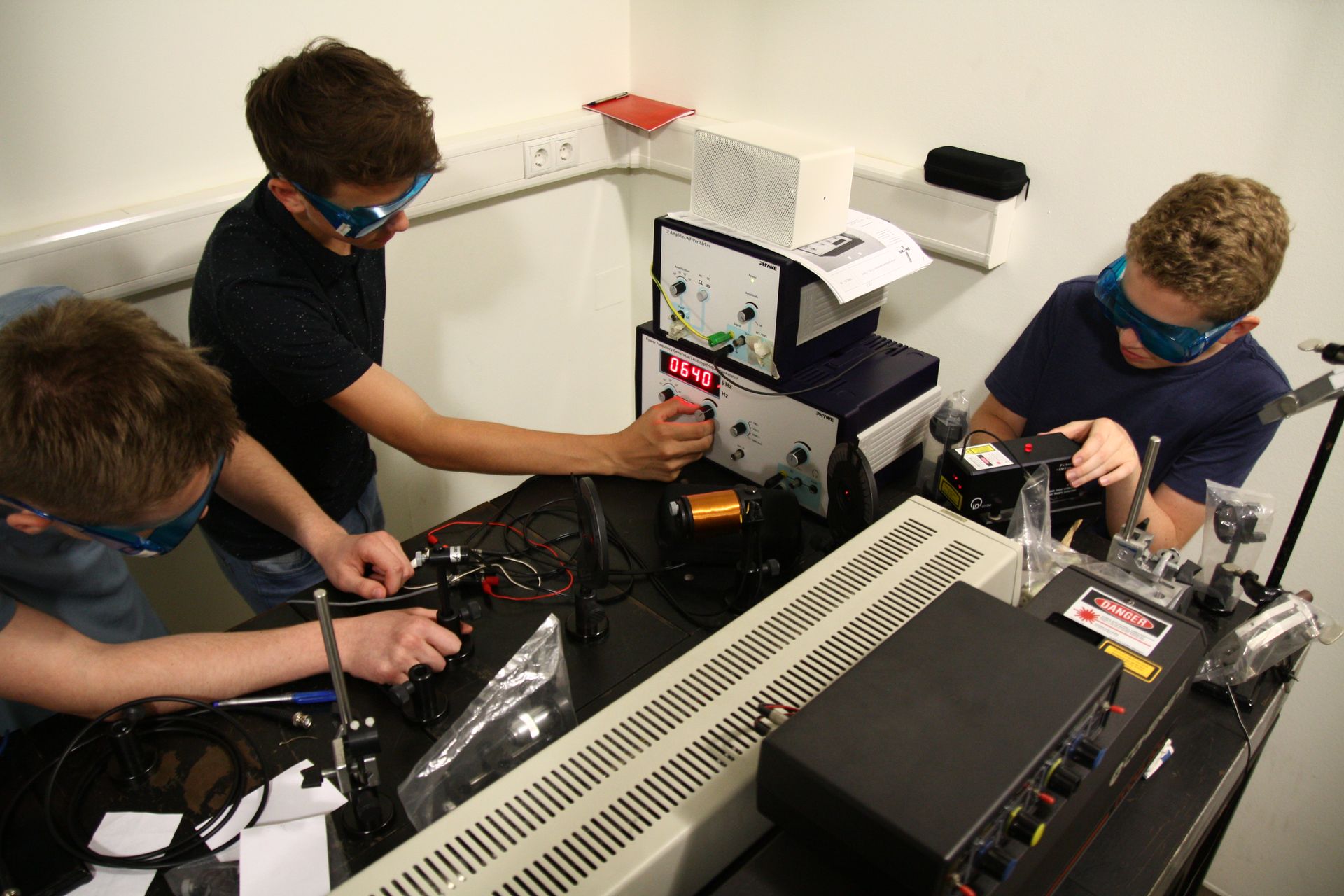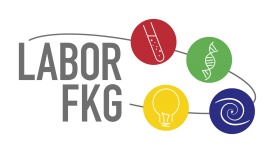Pedagocical basis
The motivation for the foundation of the student laboratory at the Friedrich-Koenig-Gymnasium in 2005 was the still unresolved lack of highly qualified specialists in the STEM fields in our country. At the same time, Germany is a country that, due to its limited natural resources, has always placed special emphasis on a high level of education for its population and can be proud of the inventiveness and innovative spirit of its citizens.
In the future, we will all face great challenges that can only be met if there are more people who are willing to face problems and develop innovative solutions. In short: More scientific research is needed to ensure a bright future for all.
If Germany is to maintain its position as an outstanding export nation, we are also dependent on engineers, technicians, computer scientists and natural scientists conducting innovative research and development.
Although these findings are certainly general knowledge, too few young people are still taking up studies in STEM subjects.
Even though a lot has happened in recent years, one reason for this lack of interest is probably the rather low status of the natural sciences in our society. This assessment is often still carried over into schools and also causes reservations about the natural sciences.
Basic ideas
If the demand for more top scientists in Germany is to be met, the foundations and enthusiasm for the STEM subjects need to be laid at school.
This is where the concept of the student science lab applies. Through experimentation as the central working method of the natural sciences, students can experience science and technology, understand their methods of working and thinking, and understand them more easily. In this way, both interest and enthusiasm for the natural sciences are awakened and developed on a broad basis.
In addition, scientific experimentation fosters the ability to make assessments, act responsibly, use digital media in a practical way, work independently and in a team, think and work analytically and solve problems. It therefore makes an important contribution to the development of personality and forms a not to be underestimated part of the students' general education. And at the same time it is fun and inspires the students!
Pedagogical considerations
Like no other subject group, the natural sciences can provide students with primary experiences. Both when experimenting and exploring natural and technical processes, it is often necessary to switch between individual models and organizational levels, and the results obtained must be analyzed, structured and interpreted. Thus, scientific experimentation promotes the ability to think abstractly, networked thinking and the competence to solve problems.
In addition, the social competence of the students matures to a special degree. When researching and experimenting in groups of two or in a team, coordinated and trusting cooperation is necessary. Only through mutual help, through the joy of taking responsibility for the joint procedure and the willingness to bear this responsibility, can the students achieve the desired results in the experiment. In this way the scientific focus class also contributes to the social development of our students.
Diverse individual experiences strengthen the students' ability to judge and encourage them to act responsibly and to self-reflect on their own actions. The students recognize opportunities, but also limits and risks of scientific work through their own actions. In this way they are generally shown the limits of human striving for knowledge and the necessity of moral consideration.
Through independent experimentation, the students also receive an additional boost of motivation.
This independent activity contributes to a positive emotional attitude of the students towards the natural sciences; in the best tradition of Pestalozzi, the education of head, heart and hand is ensured, the character of the students is strengthened, the reverence for creation is strengthened and the students' own responsibility for nature and the environment is demonstrated.
Close cooperation with chairs and institutes of the University of Würzburg prepares the students for the world of employment and enables them to make more sound choices about their studies and career later on.
These collaborations enable the student laboratory to offer not only propaedeutic and science-analogous work but also real scientific work.
Implementation
Since the most innovative research takes place at the intersections of the three classical disciplines of the natural sciences biology, chemistry and physics, the equipment of the student laboratory at the FKG enables work in exactly these fields with modern methods. Thus, the coexistence of the three subjects is transformed into an interdisciplinary cooperation through the joint accommodation in one laboratory.
The science laboratory for students at the "Friedrich-Koenig-Gymnasium" comprises a biology laboratory, a chemistry laboratory, a laser and optics laboratory, a natural science library and the Hans Haffner Observatory in Hettstadt near Würzburg.
The association "Naturwissenschaftliches Labor für Schüler am FKG e.V." (Association of the Natural Science Laboratory for Students at the Friedrich-Koenig-Gymnasium) is the responsible body for the students' laboratory. In this association, which has about 120 members, pupils, former pupils, teachers and scientists have come together.
Compared to many other student laboratories, the Natural Science Laboratory for Students at the "Friedrich-Koenig-Gymnasium" differs in some decisive special features:
Settlement at the school
The Student Laboratory is not located at a university or research institution, but directly at a school. This allows the students, initially from the Friedrich-Koenig-Gymnasium, to conduct regular and sustained experiments and to use the laboratory even at short notice, according to current experimental requirements.
Experimentally experienced students can enter the laboratories independently via a chip card system and experiment there as long as a responsible teacher is present at the school and the potential danger of the planned experiments allows this. In addition, many students also like to experiment on weekends and during vacations in order to concentrate on their project for a longer period of time without being limited by school schedules.
Community togetherness
Students, teachers and scientists share the responsibility for the student laboratory. Students organize individual areas of the laboratory operation on their own responsibility. Under the guidance of university scientists, teams of three to five students look after sophisticated laboratory equipment such as a gas chromatograph, a liquid chromatography system (HPLC), an atomic absorption spectrometer, a scanning electron microscope, various laser and optical systems, and the observatory's telescopes and measuring instruments. Students experiment on these instruments outside of class in the afternoons, but also on weekends and during the vacations. The teams of students also maintain "their" equipment, optimize its operation and develop new experiments independently.
These student teams act as far as possible autonomously, organize themselves, maintain contact with their mentor at the university and also ensure that they have suitable successors in good time before the end of their schooling and train them. If laboratory equipment is needed for courses of groups of students or for projects of individual students, the respective team of experts is in charge. If necessary, the teachers of the student laboratory are available for advice.
Without the tireless commitment of the students, the laboratory would not be possible, since the teachers who run the student laboratory also voluntarily and additionally do the work in the student laboratory beyond their regular schedule. The students also actively help with extension, renovation and maintenance work, organize storage in close cooperation with teachers and assist the teachers when younger students or groups of students need to be supervised in the laboratory. Since they are very familiar with the work processes in the student lab, they contribute profitable new ideas and concepts for improvement and optimization. For example, students have created and programmed the databases for recording and managing the stock of chemicals in the student laboratory or the software for evaluating and archiving the numerous measurement results from the various research projects.
Some pupils are involved in the pupils' laboratory beyond their school-leaving exams and, as students, help to supervise the pupils in the laboratories or during observation nights at the observatory. This also strengthens the interaction between school and university.
Thus, the students' personal responsibility is already conceptually included in the organization of the student laboratory, which systematically leads them to the greatest possible independence. In the students' science laboratory the ideal of learning by teaching is realized.
Cooperation
The Student Laboratory cooperates very closely with institutes, chairs and working groups at the University of Würzburg. Many suggestions and ideas for experimental and research projects come from the scientists, who not only provide their know-how, but also some of the materials, or even realize their ideas themselves with students in the Schülerlabor.
The Hans-Haffner Observatory of the Students´ lab has been official since 2016 through a cooperation agreement between Students´ lab and the University School and University Observatory. Here, not only courses, internships and projects for pupils take place, but also astrophysical internships for students of the University of Würzburg. Pupils and students visit the practical courses alternately, whereby students also learn from experienced pupils, e.g. first basics for handling the telescopes and cameras. In this way a real interlocking between school and university is achieved.
The various facilities of the student lab are also used by students from other schools.
On the one hand, groups of pupils can obtain first insights into various scientific fields in one- or two-day courses. On the other hand, the Students' Laboratory at the "Friedrich-Koenig-Gymnasium" is always open to pupils for individual research projects (e.g. as part of a W seminar paper or a "Jugend-Forscht" project). Especially the last area is the great strength of the schools student lab.
Focus on current research
The student laboratory is experimentally oriented towards current research questions. Due to the close interaction with various research groups at the University of Würzburg and the involvement of the top-class scientific advisory board, even ambitious projects can be realized. This has resulted in joint real research projects in which close cooperation between scientists and pupils is. the basis for success.
Team-oriented research and participation in cutting-edge topics motivates and encourages remarkable achievements in practice and theory. Since scientists also act as mentors to school teams, they achieve a high level of expertise in the laboratory equipment and also take on tasks for scientific projects, such as determining the potassium and sodium content of plant material with the atomic absorption spectrometer, taking electron microscopic pictures or making thin sections of tissue with the school lab's own microtome. The students are accompanied by teachers, but apart from that they work completely independently. Such work is incorporated into the scientists' research and has in part already been used in scientific publications. At the Hans Haffner Observatory, too, scientific research is carried out in addition to the practical training of pupils and students, which is particularly important here. In addition to staff of the Department of Astronomy and students, students make a particularly large contribution.
The students experience the international cooperation of scientists as a guarantee for successful research. This strengthens the European consciousness and the spirit of international understanding.
Students, teachers and scientists run the students´lab on a voluntary basis in addition to their normal obligations.
The financing of the facility and the operation of the laboratory is carried out through the support of foundations, donations from companies and private persons, prize money and income from the supporting association (membership fees, income from catering).
In order to enable each student to use the lab according to their own motivation, the use of the student lab is free of charge.


